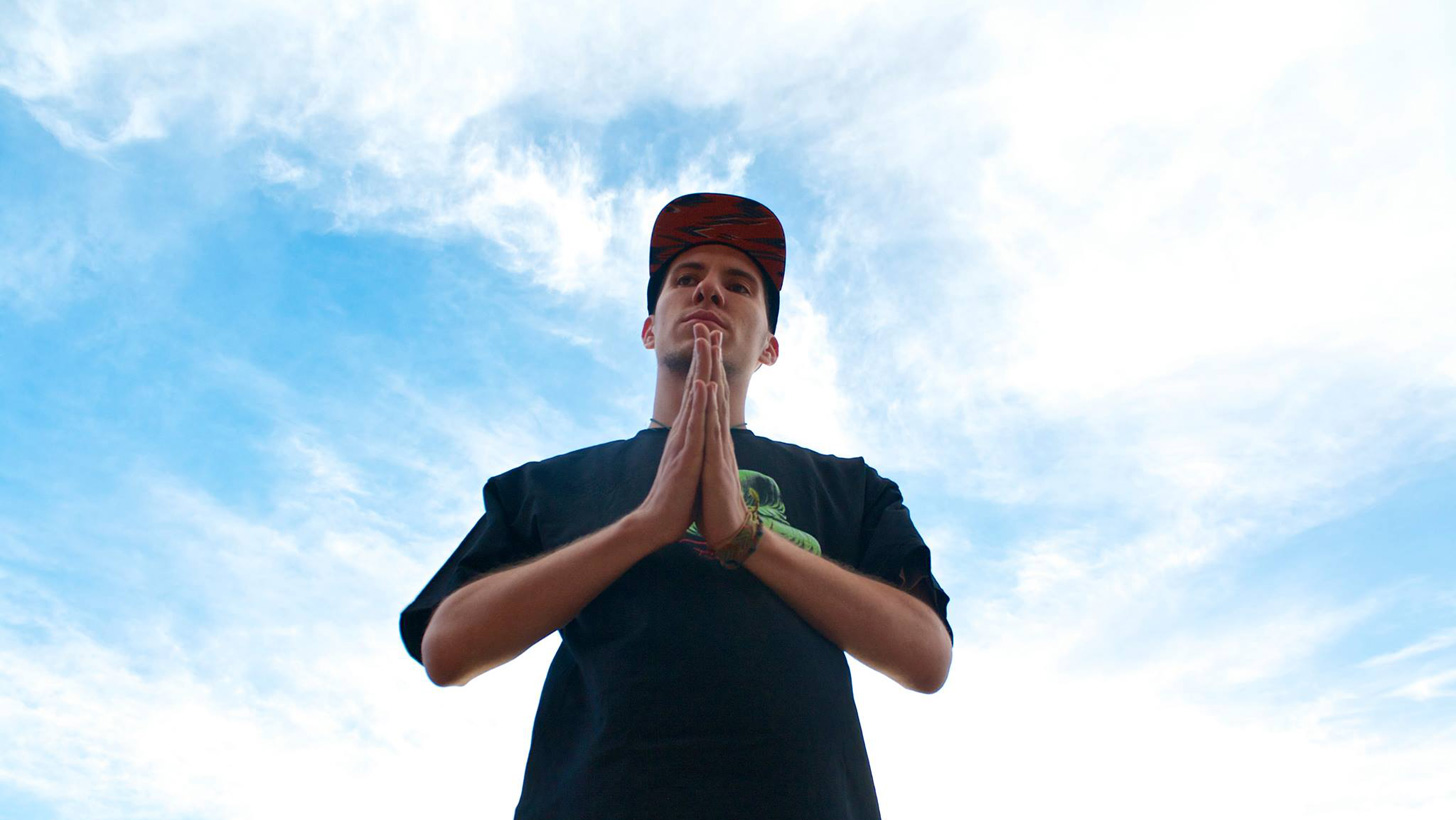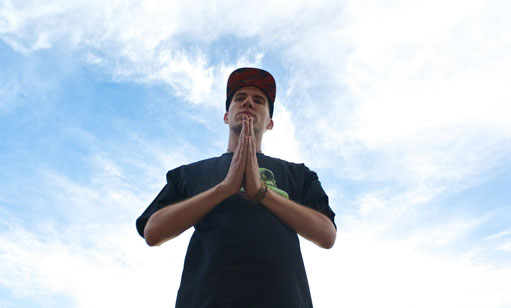Wake Self is a local hip-hop artist whose work with community at Warehouse 508 contributes to his role as a leader in Burque’s section of hip-hop nation. A contemplative and powerful speaker whose beliefs echo the community he calls home, Wake Self presents many ideals he believes can be actively absorbed into a city that oftentimes neglects or oppresses its most valuable citizens.Besides having a dutiful attachment to progressive causes and making fine music—through his successful teaching tenure at the community center housed in the old Wool Warehouse Theater here in Dirt City—Wake Self is very busy ascending the music world. Tours in Europe and South America have yielded heaps of new fans. The new video for his anti-misogyny rap, “Malala,” has for realz gone viral, thanks to 240,000 views in the past couple of weeks. Meanwhile, the dude soldiers on, prepping new ideas for his Art of Rhyme and 508 recording class, questioning the world around him and consistently following his muse to new areas of discourse and diggable tuneage.The conversation I had with Wake Self was illuminating, resonating and relevant. Here’s part of what we said to one another.Weekly Alibi: Hey, Wake Self!Wake Self: Yo, yo, August!For Readers at Weekly Alibi world who may not have heard about you and your work, how about some deets?I came up in Roswell, New Mexico. I’ve been living in Albuquerque for about the past 10 or 11 years. I’ve been touring since I was 15. I’ve been to Europe, lots of shows in the UK, opportunities keep coming up. I’m going back [to Europe] in November.Would you say your work is more popular overseas than it is here in Burque?I don’t know. I do kinda good here in Albuquerque. I had my album release recently and there was about—it was at the El Rey—we had about 600 people, maybe closer to 700. That’s not bad for a local show.El Rey seems to be the locus of a growing hip-hop scene here in town. How is hip-hop nation expanding in the Duke City?Yeah, I mean hip-hop is always growing. I don’t know if you saw that article recently, the one that said hip-hop took over as the most popular music genre in the world.I think I wrote that.[Laughs]. It would seem mostly that they’re listening to hip-hop. This is interesting because if you look outside of this country, into the rest of the world, right now, they [audiences] seem to really like classic-sounding hip-hop. Here in America, there’s still a big market for classic hip hop.You mean like ‘90s style Golden Age hip-hop?Yeah, stuff like that. Out there in the world, it gets really big shows. An artist with those sensibilities may be able to pull 300 people per show in the states, but in Europe, they can do a show with 1000 people, easy. One of my close friends, who is also one of my favorite rappers, Masta Ace, has a style similar to that. He does good here, but overseas, he’s treated like it was still the 1990s, like he is star. My thing is that I feel like a lot of our legends sort of get disregarded in American culture. That’s unfortunate.In America, is it still all about what’s new while the past is constantly forgotten?You know, in America, we have a very short attention span, when it comes to almost everything, really.I agree. I think sometimes folks listen to popular music without knowing or wanting to know the history of that music, where it came from, who did it first.That tendency seems to be a little bit different in country and in rock, in my opinion. In those genres you still have legends that can draw really huge audiences. There’s only a few acts like De La Soul, A Tribe Called Quest and Wu Tang [Clan] that still pull, but many of the rest have been relegated to bundled, back-to-the-’90s package tours. I think it has to do with the way you do your career. There’s certain artists that are capable of re-inventing themselves … That’s something Masta Ace did. I went on tour with him last year. He did some in-store appearances, mostly at local skate shops, and all of the fans that came to his meet and greets were under 21! He started rapping in 1988. That’s pretty intense.So things like that seem to indicate the cultural tide is turning, right?Well, situations like that [described above] are a good cause for optimism. Something else that helped out recently was a show on Netflix that was really popular. It [Hip-Hop Evolution] was all about late ’80s, early ’90s hip-hop culture, like the beginning of our culture. A lot of kids were watching that, I noticed that among my students. What’s the deal with your students?I teach here in Albuquerque at Warehouse 508, which is a city of Albuquerque sponsored thing and also out on the reservation. Sometimes I lecture at colleges in the area, too. I do a lot of work in the community. I’m not good at talking about all the things I do, but I really enjoy my life I’m really in the moment. There are a lot of creative and cultural activities I do that people don’t know about. I definitely try my best to teach a lot of kids who are into hip-hop. I try to show them different approaches I know about. I also have a class that’s about learning how to make beats, write songs, record them.Speaking about youth, the community and culture, let’s talk a little bit about “Malala,” a recording and video that address the issue of misogyny in hip-hop culture.Malala was going through some tribulations with the Taliban because she was fighting for women’s right to an education. They didn’t want that to happen, she was making a lot of noise. They shot her in the head but she survived. She went on to write a book and won the Nobel Peace Prize. To me, it’s cool that that’s a woman who did that. Her story is incredible and it caused me to formulate a flow about her life. It marinated for a while, but the main reason I thought to do this now has to do with the fact that I like to hear things [from myself] that others dare not say. In another way, there’s a lot of people who say important things, but aren’t reaching [a wide audience]. Someone told me that I’m the bridge between the youth and the elders, because my music resonates with both. Kids like the modern sound, OGs like the classic hip-hop foundation, which makes for a beautiful thing that communicates values. I feel that sometimes people have these culturally significant conversations between themselves, but putting that into a song helps further the discussion, makes it public.What’s the reaction been like from your audience, from those who interact with your art?It’s definitely a beautiful thing when you hear about people connecting with your work. I said the thing they wanted to hear. I get a lot of messages from people, explaining their story, how her story and my telling of it is a great motivation for them to keep going, to embrace change and evolution. [For] Women who are going for it, starting their own business, engaging the world, this song has been the real thing. That’s one of the main reasons I make music, to build people up. I used to make music that was about my struggles, but anymore I also like to grow awareness. That was one of my reasons for listening to music initially.What is especially important to your artistic and cultural sensibilities now, as expressed in “Malala”?I think gender inequality is an important issue right now. And we’re very far behind. The way cultural systems are currently set up has happened through male dominance. Masculinity is involved with injustice. The western world has been based on that standard. Being a woman, especially a woman of color is probably one of the hardest things to be on this planet. So, what can we do in the world right now? For me, my part is trying to stand up for what’s right.Are you’re hoping to influence people?I feel like, a lot of the time, young males need to see, they need to have the positive influence of another male. The majority of portrayals of men in popular culture, the movies, hip-hop, are centered on greed and power. It sucks that women are so objectified in those mediums. A lot of people ask me if I’m a feminist. That hits me in a weird way, because yes I am. But to me, I feel like it’s just common sense and morals. Feminism shouldn’t be anything groundbreaking, it should be the way we do business with other human beings. It shouldn’t be radical or crazy to say that people should be treated equally. It’s not revolutionary, but because of the way our society was set up using a patriarchal model, it is.
Masta Ace and Wake Self perform:
SOMOS Albuquerque • Saturday, Sept. 23



